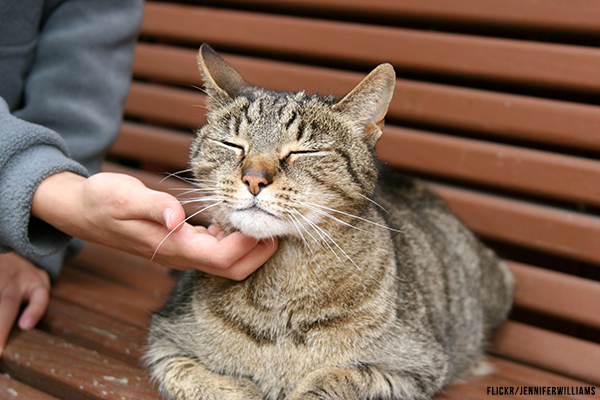This might sound a little strange, but we are worried about cats. Not just the damage they do to our wildlife, but their own welfare too. That is another reason why we want to talk about managing cats.
Cat management is not only better for native wildlife, property owners, and those concerned about their family’s exposure to toxoplasmosis, it is better for cats too. This is certainly the case for unowned (stray and feral) cats, which can lead a short, brutal, disease-ridden life. But even an owned cat is better off if it has a responsible owner that prevents it from wandering. In fact, cats that live the majority of their lives indoors are overall healthier, if given stimulation and raised that way from a kitten.
The Short, Brutal Life of Stray and Feral Cats
Stray and feral cats are unowned and permanently outside, so they can lead short, miserable lives that are often punctuated with injuries, starvation and illness. And when strays become plentiful in an area, volunteers report that incidences of cruelty also rise as locals become frustrated with the nuisance they cause. In New Zealand the place of cats is not in the wild, it is in the home.
New Zealand has a persistent stray cat population. Despite years of hard work by volunteers in this area, there are no signs of stray cat populations falling. Euthanasia rates in animal shelters have stayed persistently high – they have only brought them down in Wellington by refusing to take in more strays. An estimated million kittens are born in Auckland every year alone – the vast majority of these die.
In recent years, instead of euthanising stray and feral cats, attempts have been made to manage them in outdoor colonies. This approach, known as Trap Neuter Return (TNR), is popular with the SPCA here but has now been generally discredited overseas. It often fails to manage the colony down to zero, and neutering and feeding these cats requires enormous resources. This is why Australia has a campaign to not feed stray cats – they want people to take full responsibility for the animal or none at all.
Clearly cat welfare is not served by letting cats wander, nor by allowing large numbers of unowned cats to live in outdoor colonies where they are more susceptible to poor condition, increased disease and a shortened lifespan. The only way to stop this suffering (and that of future generations) is by finding them responsible home from which they are not allowed to wander or removing them from the population.
Pet cats should ideally be kept indoors
The facts are similar for owned cats. Overseas evidence shows that outdoor cats live a shorter life and more commonly dies of illness and physical harm from injuries, accidents and fights with other cats. While cats have fewer predators in New Zealand than overseas, road accidents, disease and fights are still a problem. Responsible pet owners should aim to keep their cat indoors as much as possible to minimise their wandering. In fact if a cat is kept indoors (or in enclosed cat runs) from being a kitten , there is no negative impact from an indoor life. This is now normal practice in parts of Australia and the United States.
We could encourage this to happen by microchipping all owned cats. If found wandering, owned cats could be returned to their owners, and unowned cats could be rehomed responsibly or humanely euthanised. In short, we need to manage cats like dogs.
Why Should We Manage Cats Like Dogs? Aren’t They Different?
Some may think that these animals are different, but this is based on our attitudes rather than reality. Samoa are having the same conversation about managing stray dogs are that we are having about cats – some there argue that dogs have a right to wander as strays. Sadly this view is based on ignorance and the way things have been rather than on evidence, and in some cases reflects the cat owner’s reluctance to be bothered caring properly for their cat as well as their ostrich-like denial of their negligence being bad for their cat, bad for their neighbours, and bad for the environment.
Most of Australia manages cats like dogs. How long before we catch up?
Most states in Australia have some form of cat management, with Western Australia, New South Wales, ACT and Victoria including requirements like compulsory registering, neutering and microchipping. Some areas (such as suburbs in Melbourne and Canberra) have full-blown cat curfews. The cat population in Australia has fallen 20% since 1989.
Are we really less concerned about our wildlife than Australia?

